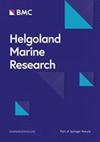Follower fish of the goldspotted eel Myrichthys ocellatus with a review on anguilliform fish as nuclear species
4区 地球科学
Q2 Agricultural and Biological Sciences
引用次数: 2
Abstract
In a nuclear-follower fish foraging association, the follower benefits from food uncovered or flushed out when the nuclear fish disturbs the bottom, while nuclear species generally do not seem to be benefiting. Among nuclear species, eels (anguilliform fish) are known to be one of the most represented groups. Here we investigated the frequency and time duration of foraging associations among the goldspotted eel Myrichthys ocellatus and reef fish in a subtropical marginal reef. In addition, we reviewed nuclear eel species and their followers described in the literature. From a total of 211 goldspotted eels observed, seven follower species were recorded in 19% of the samples. The average time of the following associations per species ranged from 40 to 190 s. Four species were reported for the first time as M. ocellatus followers (Bodianus rufus, B. pulchellus, Stephanolepis hispidus, and Serranus baldwini) and three of them have never been reported in the literature as eel followers (B. pulchellus, S. hispidus, and S. baldwini). The literature describes 13 eel species acting as nuclear for 66 fish species, represented mainly by groupers and sea basses. The size of the eel was not correlated with the size of its follower and neither with the number of described follower species. The nuclear role of eels is likely to be an important component of the trophic ecology of small and medium-sized macrocarnivore fish.金斑鳗的跟随鱼及核种鳗形鱼的研究进展
在一个核跟随鱼觅食协会中,当核跟随鱼扰乱底部时,跟随鱼会从食物暴露或被冲走中受益,而核跟随鱼通常似乎没有受益。在核物种中,鳗鱼(鳗状鱼)是已知的最具代表性的群体之一。本文研究了亚热带边缘珊瑚礁中金斑鳗与珊瑚鱼的觅食关联频率和持续时间。此外,我们回顾了文献中描述的核鳗种类及其追随者。在总共211条观察到的金斑鳗中,19%的样本中记录了7种跟随者。每个物种结合力的平均时间为40 ~ 190 s。其中4种为首次报道的鳝属(Bodianus rufus、B. pulchellus、Stephanolepis hispidus和Serranus baldwini), 3种为文献未见报道的鳝属(B. pulchellus、S. hispidus和S. baldwini)。文献描述了13种鳗鱼是66种鱼类的核心,主要是石斑鱼和海鲈鱼。鳗鱼的大小与其追随者的大小无关,也与所描述的追随者物种的数量无关。鳗鱼的核作用可能是中小型大型食肉鱼类营养生态的重要组成部分。
本文章由计算机程序翻译,如有差异,请以英文原文为准。
求助全文
约1分钟内获得全文
求助全文
来源期刊

Helgoland Marine Research
地学-海洋学
自引率
0.00%
发文量
0
审稿时长
6-12 weeks
期刊介绍:
Helgoland Marine Research is an open access, peer reviewed journal, publishing original research as well as reviews on all aspects of marine and brackish water ecosystems, with a focus on how organisms survive in, and interact with, their environment.
The aim of Helgoland Marine Research is to publish work with a regional focus, but with clear global implications, or vice versa; research with global emphasis and regional ramifications. We are particularly interested in contributions that further our general understanding of how marine ecosystems work, and that concentrate on species’ interactions.
 求助内容:
求助内容: 应助结果提醒方式:
应助结果提醒方式:


